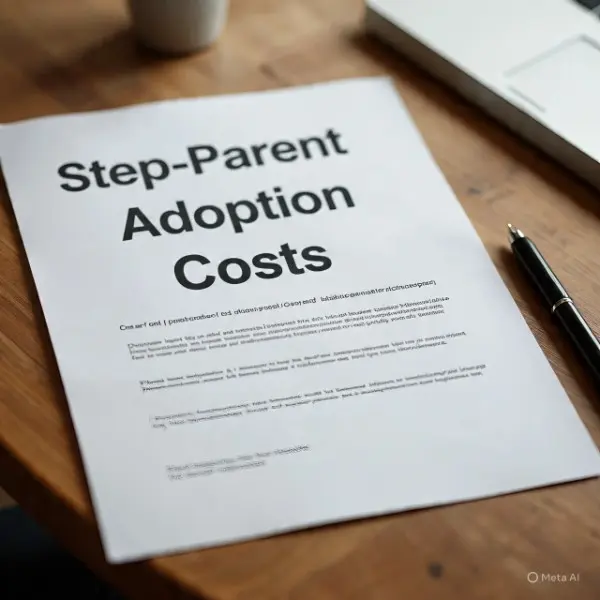Step-Parent Adoption Costs 5 Ways to Save Big Money

What Sarah did when she picked up the adoption attorney’s fee estimate surprised everyone. The figure she saw on the paper—$4,500 for step-parent adoption—felt overwhelming.
As a single mom who had just remarried, she dreamed of her new husband officially adopting her 8-year-old son, but step-parent adoption costs was overwhelming.
Like many others in the step-parent adoption journey, Sarah realized that while creating legal family ties is important, it often comes with unexpected bills that can throw a wrench in even the best-laid plans.
If you’re in a similar boat, you probably want to give your blended family that sense of security and legal backing that comes from step-parent adoption, but those costs might make you wonder if it’s even possible.
The good news is, with a bit of planning and some insider tips, you can cut down your step-parent adoption costs while still keeping the process on track.
Research from The American Academy of Adoption and Assisted Reproduction Attorneys shows that step-parent adoptions make up about 42% of all adoptions in the U.S., and the costs range from $1,500 to $8,000, depending on how complicated things are and where you live.
However, families who understand the step-parent adoption process well and use an effective game plan spend about 40-60% less than those who dive in unprepared.
Understanding Step-Parent Adoption Costs: The Financial Landscape:
Before we jump into the money-saving tactics, it’s vital to get a handle on what factors contribute to step-parent adoption costs and why these costs can differ so much based on various situations and locations.
A typical step-parent adoption comes with certain unavoidable expenses, no matter how you approach it. Court filing fees are usually between $150 and $500, and they depend on where you are. These fees cover the costs of processing your petition and setting up necessary hearings.
Plus, you can expect to pay an additional $50 to $200 for background checks, as most places will require criminal history checks for the adopting parent.
Home study requirements, although not as common in step-parent adoptions as in other types, might still apply sometimes and can set you back between $500 and $2,000.
Also, preparing legal documents—including petition drafting and court filings—can be another significant expense that varies based on whether you choose to hire a professional or do parts of it yourself.
One of the biggest cost factors usually comes from legal representation. Attorney fees for step-parent adoption can range from around $1,000 to over $5,000, depending on how complex the case is, where you live, and the level of service you need.
If there are contested biological parent rights or interstate issues involved, fees will go up due to the extra time and expertise required.
Geographic Cost Variations in Step-Parent Adoption
Step-parent adoption costs can be different, depending on your place of residence, but the most interesting thing now is that urban areas are now charging more than rural ones.
States like California, New York, and Massachusetts are always among the priciest for adoption proceedings, while places like Montana, Wyoming, and Alabama tend to offer more wallet-friendly options.
It will be much easier for you if you know your local market, and it can help you set realistic budget expectations and spot potential ways to save.
For instance, some counties provide reduced filing fees for families showing financial hardship, while others have self-help resources that can help minimize the need for an attorney in straightforward cases.
Five Proven Strategies to Reduce Your Step-Parent Adoption Costs:
Strategy 1: Get the Hang of Self-Representation for Simple Cases
A great way to cut down on step-parent adoption costs is by figuring out what parts of the process you can do yourself versus what really needs a pro’s help. A lot of straightforward step-parent adoptions, especially those with a consenting biological parent, can be done with minimal attorney involvement.
Self-representation works best when a few things line up, for example, when the biological parent agrees to the adoption or has already given up their parental rights, there aren’t any interstate snags, and the adopting step-parent meets all the basic eligibility requirements.
In these situations, families can often manage petition prep, document gathering, and initial court filings on their own, keeping attorney help for specific questions or a final review.
Take Maria’s case, for example. When she looked into adopting her stepdaughter in Arizona, a family law attorney quoted her $3,200. But then she found out her county’s self-help center offered step-parent adoption packets with step-by-step instructions.
By preparing her own paperwork and just meeting with an attorney for a quick final review, she brought her costs down to $750, saving over $2,400 without compromising the success of the adoption.
The trick to pulling off self-representation is being well-prepared and honestly assessing how complicated your case is. Simple adoptions with cooperative biological parents can often go smoothly, while contested or more complex custody cases usually need a bit more professional legal guidance.
Strategy 2: Use Family Court Self-Help Resources:
These days, many family courts have helpful self-help resources aimed at guiding families through the step-parent adoption process. Surprisingly, these tools are often overlooked, even though they can save adopting families a good chunk of change.
Most family court self-help centers have form packets, instructional guides, and sometimes even one-on-one help with filling out documents. A lot of centers run workshops or group info sessions that dive into what’s needed for step-parent adoption, complete with chances for Q&A with court staff who can clarify any specific requirements and timelines.
In recent years, online resources have really taken off. Many courts now offer video tutorials, downloadable forms, and FAQ sections that tackle common step-parent adoption questions. Some forward-thinking areas even let families book virtual appointments to get guidance without having to set foot in the courthouse.
For example, in Texas, the family court system does a fantastic job by providing detailed step-parent adoption guides in several languages, help with filling out forms, and practice sessions for court appearances.
Families who know about these resources and tap into them often see savings ranging from $1,500 to $2,500 compared to hiring a full-service attorney.
Strategy 3: Negotiate Unbundled Legal Services:
Instead of going for full representation from an attorney, many families find that they can have tremendous savings from unpacked legal services. With this approach, attorneys help out with specific parts of the adoption process rather than handling everything from beginning to end.
Some common unbundled options include document review only, where attorneys check your self-prepared paperwork for accuracy before you file it. This usually costs around $300 to $800, compared to $1,500 to $3,000 for full representation. There are also consultation-only services, where you can get legal advice while you concentrate on taking care of the paperwork and filing yourself.
Then, there’s limited court representation. This is where attorneys show up with you for certain hearings or take care of specific tasks, so you take care of other aspects on your own. It’s a solid option for families who are comfortable with paperwork but feel a bit jittery about appearing in court.
When discussing their services, it’s important to clearly ask them what’s included and set expectations for communication.
While some attorneys offer flat fees for particular services, many others charge hourly for consultations. If it is important to you, ask, so you know the differences, which can help you pick the best and most affordable option that works for you.
Strategy 4: Time Your Adoption Strategically:
Timing is another important thing that plays a crucial role in step-parent adoption costs, more especially when it comes to court schedules, attorney availability, and the seasonal factors that can affect fees.
Many family law attorneys see changes in demand with the seasons, often having quieter periods in the summer and between Thanksgiving and New Year’s.
During these breaks, some attorneys might offer lower rates or package deals just to be busy. Also, note that newer attorneys just starting out might have better pricing compared to the more established firms.
Court scheduling can also impact costs since delays can drag things out and add to your expenses. Just be aware of your local court’s calendar and filing, because during less busy times things can speed things up and you can cut tremendous costs.
Some jurisdictions even fast-track step-parent adoptions during certain months or for families who meet specific criteria.
Think about when to schedule your home study, if it’s needed. Planning it for when the adoption professional is less busy usually results in lower fees and quicker completion. Many agencies provide discounts during slower months or for multiple services booked at once.
Strategy 5: Maximize Available Financial Assistance Programs:
There are so many financial assistance programs out there to help families cover step-parent adoption costs that people are not aware of. Programs like federal and state adoption tax credits, employer benefits, and nonprofit assistance can really lighten your financial load.
The federal adoption tax credit allows families to claim up to $15,950 for qualified adoption expenses per child, which includes a lot of step-parent adoption costs.
Although this credit doesn’t give you immediate cash, it will help to reduce your overall tax bill and make adoption more affordable. Depending on where you live, there might even be state-specific adoption credits or deductions to help you cut your step-parent adoption costs.
Note also that many employers now include adoption benefits in their rewards. These programs can reimburse you for qualifying adoption costs, which might range from $1,000 to $10,000 per adoption.
I will advise that you check with your HR department to see what benefits you have, as many people don’t take advantage of these opportunities simply because they’re not aware they exist.
Nonprofits also play an important role, by offering grants and assistance that will help ease your step-parent adoption costs. Groups like the National Adoption Foundation and the Dave Thomas Foundation for Adoption provide financial help to eligible families. While competition for these funds can be tough, applying doesn’t cost anything and can lead to tremendous savings.
Understanding the Costs of Step-Parent Adoption:
When you’re looking into step-parent adoption, it’s important to get a grip on the costs involved. Knowing all about what to expect can help you plan your budget better and maybe find some ways to save. Let’s take a look at the typical expenses that come up based on different situations and where you’re located.
Court and Administrative Fees:
Expected filing fees cost you about $150 to $500, and note that urban courts generally charge more than those in rural areas; these fees must be paid irrespective of how you are going through the adoption process. However, some courts may see the need to offer payment plans or reduced fees for families who are facing financial difficulties, but that’s optional.
Background Check Costs: Step-parent adoption costs varies by state and also depends on how deep the screening goes; usually, it costs between $25 and $150 per person. If FBI fingerprinting is needed, then another $15 will be added to $50. These checks are crucial to make sure the adopting parent meets the safety standards for child custody.
Professional Services: Hiring an attorney for full-service representation could set you back anywhere from $1,500 to $5,000, depending on how complex your case is and where you live.
This will cover everything from preparing the petition to finalizing the decree. However, if you’re looking for mid-range legal help, like just document prep and limited representation, that will cost around $800 to $2,500.
For minimal legal consultation—where you just get advice or have documents reviewed—you’re looking at about $300 to $800. On the flip side, if you’re going for self-representation with court help, you might only pay the necessary fees plus some costs for copying and notarizing, usually under $500.
Other Potential Expenses: If a home study is required, it can cost between $500 and $2,000 depending on the agency and where you live. Appointing a guardian ad litem in contested cases can add another $500 to $2,500. And if you need to travel for out-of-state proceedings or to get documents authenticated, those costs can range from pretty minimal to several hundred bucks.
Understanding these different costs will help you weigh your options and make smart choices about how to use your adoption budget effectively.
Avoiding Mistakes That Drive Up Costs:
A lot of families end up spending more on step-parent adoptions than they need to because of avoidable mistakes. Learning from others’ experiences can save you both money and a lot of headaches.
One of the biggest costly blunders is hiring full-service legal help for straightforward, uncontested adoptions. While more complex cases definitely need a lawyer, simple adoptions can often go smoothly with a bit of minimal help, meaning you could save a ton.
If you fail to research your local court requirements, it can lead to rejection of your file, which means you’ll have to refile and pay extra fees, not to mention the delays. Each court has its own specific rules about what documents and procedures it needs, so you must understand them on time to avoid unnecessary costs in the future.
Many families also underestimate the importance of getting proper consent from biological parents, until it leads to contested proceedings that will add additional costs to their budget. Don’t make that mistake too.
Ensuring that consent is clear and legally valid before you file is key to speeding up the adoption process and avoiding expensive legal battles. If there’s any uncertainty about consent, getting legal advice early can save you money in the long run.
Procrastination can cost you more than you think, and rushing through the process often requires express services that come with higher prices. Having a clear timeline and giving yourself plenty of time can help you find cost-saving opportunities and avoid those last-minute rush fees.
Some families believe they can easily save cash when they use outdated forms or generic documents that aren’t meant for their area. This often leads to rejections and delays, costing more than just getting the right documents in the first place.
When To Get Professional Help:
This guide is all about showing you ways to save on step-parent adoption costs and other costs, but there are definitely times when it makes sense to invest in professional legal help. Knowing when to bring in the pros can help prevent expensive mistakes that could put your adoption at risk.
For contested adoptions—where biological parents are against the process or where there are unresolved custody issues—you really need solid legal support. Seeing how complex and high-stakes these cases can be, it can be too risky for you to try to go it alone and it can cost you more than you have budgeted.
Interstate adoptions are more complicated than local adoptions because and that’s because you’ll need to go through different jurisdictional rules and interstate procedures. Lawyers experienced with these issues can make sure everything is handled correctly to avoid any mistakes that could derail the adoption.
Certain situations, like with military families or international elements, often involve unique requirements and complications that you might not think of, making professional guidance very valuable.
If you don’t know where biological parents are or if there’s a chance they won’t cooperate, attorneys can be really helpful in conducting searches, serving legal notices, and dealing with any challenges that come up. Even though these services can be pricey, they’re often essential for successfully completing an adoption.





